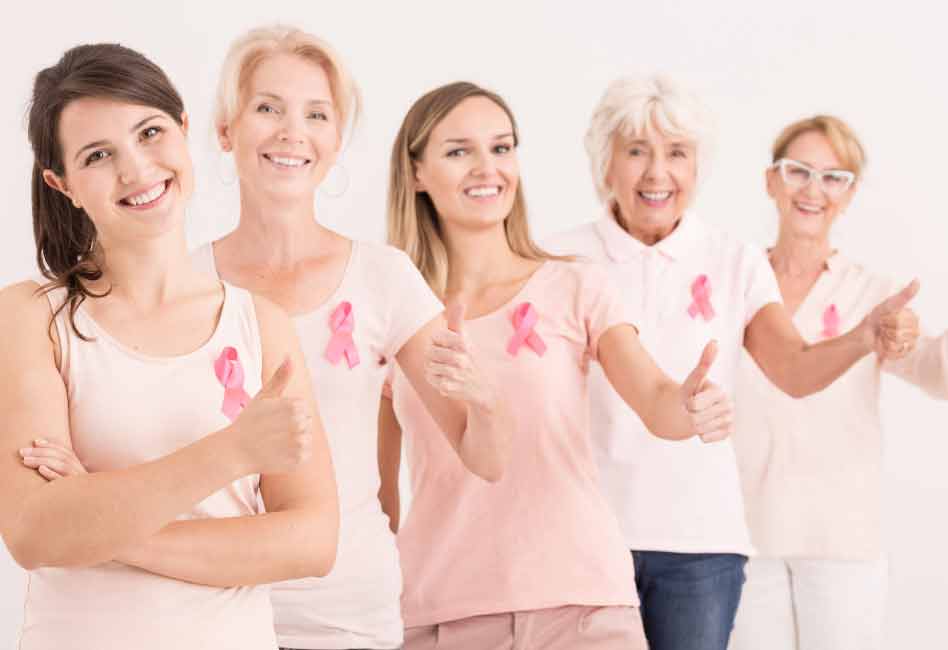Every fall, as nature (and retailers) don a palette of gold, orange and brown, you may also notice a fair amount of pink in the mix, as October is National Breast Cancer Awareness month. But as the second-leading cause of cancer deaths for women, and one that has become increasingly survivable with early detection, year-round attention to the preventive steps you can take is key.
Live a Healthy Life
The first, and easiest, step to avoid being diagnosed with any cancer is to pay close attention to your overall wellness and lifestyle. Eighteen percent of all of cancer cases are attributable to the combined effects of excess body weight, alcohol consumption, physical inactivity and an unhealthy diet, according to the American Cancer Society. So what changes can you make?
-
Keep weight within doctor recommended body mass indicator (BMI) standards, which are used to assess potential health risks.
-
Eliminate alcohol consumption or limit to no more than one drink per day for women and two drinks daily for men.
-
Increase physical activity each week to include 150 minutes of moderate aerobic activity such as walking or gardening, 75 minutes of vigorous aerobic activity such as swimming or jogging or an equivalent mix of the two.
-
Make healthier eating choices. A diet rich in whole fruits, fiber-rich vegetables and whole grain breads will not only reduce your risk, but help maintain the healthy weight you are exercising toward.
-
Get your vitamin D. Studies also have shown that getting enough vitamin D3 can reduce your risk of breast cancers as well.
Stay Aware of Your Hormone Levels
While there are many different types of breast cancer, around 70 percent of them are sensitive to the hormone estrogen or progesterone. Cells from these types of cancers have receptor sites that bind to estrogen/progesterone, promoting their growth and opportunity to spread. Factors that influence estrogen production include:
-
Weight and activity levels. As estrogen is produced in fat cells as well as in your ovaries, maintaining a healthy lifestyle is important.
-
Menstrual cycles. An early start to menses or a late onset of menopause can increase your body’s natural exposure to estrogen, increasing risk.
-
Hormone replacement therapy and birth control pills. Although both provide medical benefits that may outweigh the risk, some forms can increase your chances to contract breast cancer by up to 26 percent and alternatives should be discussed with your healthcare provider.
Be Aware of Your Family’s Medical History
As with other genetic illnesses, breast cancer can be passed on by inheriting a mutant gene (BRCA) from either parent. Studies have shown that although rare, those testing positive for this gene increase their risk from 12 percent to 72 percent. The United States Preventive Services Task Force recommends that women who have family members with breast, ovarian, fallopian tube or peritoneal cancer be evaluated to see if they might be carrying the gene. A simple DNA test using a blood or saliva sample can give you an answer within weeks, allowing preventive options to be considered before potential cancers present.
Finally, Be Proactive
New drugs and medical treatments increase breast cancer survival exponentially, but early detection is crucial and easy! Regular at-home self-exams will keep you aware of any changes to your breast’s shape, color and size. Annual well-check doctor visits also provide the testing and feedback required to catch potential breast cancers, as well as identify several other health issues.
And finally, take advantage of medical screening options such as mammograms, ultrasounds and medical resonance imaging (MRI). Recommended for all women beginning at age 40, and earlier if issues arise, mammograms not only deliver a detailed look at the health of your breasts, but more often than not, allow for peace of mind.
Read More: Orlando Health: Simple Lifestyle Changes That Can Reduce Your Breast Cancer Risk

